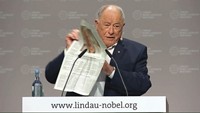Advertisement
Grab your lab coat. Let's get started
Welcome!
Welcome!
Create an account below to get 6 C&EN articles per month, receive newsletters and more - all free.
It seems this is your first time logging in online. Please enter the following information to continue.
As an ACS member you automatically get access to this site. All we need is few more details to create your reading experience.
Not you? Sign in with a different account.
Not you? Sign in with a different account.
ERROR 1
ERROR 1
ERROR 2
ERROR 2
ERROR 2
ERROR 2
ERROR 2
Password and Confirm password must match.
If you have an ACS member number, please enter it here so we can link this account to your membership. (optional)
ERROR 2
ACS values your privacy. By submitting your information, you are gaining access to C&EN and subscribing to our weekly newsletter. We use the information you provide to make your reading experience better, and we will never sell your data to third party members.
ACS Meeting News
Editorial: At the ACS Fall 2022 meeting, we heard from Joachim Sauer, quantum chemist and spouse of former German chancellor Angela Merkel
by Bibiana Campos Seijo
August 28, 2022
| A version of this story appeared in
Volume 100, Issue 30
The American Chemical Society Fall 2022 meeting took place in Chicago from Aug. 21 to 25. As is now the norm, it was a hybrid meeting, but I had the privilege of attending it in person. It was the first scientific meeting I traveled to after 2½ years of hiatus because of the pandemic, and I’m very glad I was able to make it. With attendance almost back to prepandemic levels, it was busy and felt inspiring, lively, and energizing.
There are many highlights from the meeting (see page 4), but one session that I particularly enjoyed was a presidential event titled “From the Shadow of the Berlin Wall to the Spotlight of International Politics.” The speaker was quantum chemist Joachim Sauer from the Humboldt University of Berlin. ACS president Angela Wilson invited Sauer to share highlights of his career and details of his research, as well as his experience as spouse of former German chancellor Angela Merkel.
This session was unique because Sauer is a very private man, and, during his wife’s many years of service, he stayed out of the public eye. He has consistently refused to talk to the media and appeared with Merkel in public only when protocol made it necessary. The event marked a break from this long-held practice, and he spoke candidly about his life and career in front of a room of interested chemists.
Sauer and Merkel were both born in East Germany and met at the Academy of Sciences in Berlin, where she completed a PhD in quantum chemistry, although she’s a physicist by training. Sauer had completed his doctorate at the Humboldt University a few years earlier and was teaching at the academy at the time. They have one scientific paper in common.
Sauer conducts computational studies to better understand zeolites—microporous materials commonly used as catalysts and adsorbents. When asked about what got him into science, he explained that “everything starts with excellent teachers.” But it was his fascination with the Schrödinger equation, which he came across in an article about chemical bonding in Scientific American, that got him into chemistry and the world of quantum mechanics.
Sauer spoke about his life as a scientist behind the iron curtain. Although he was unable to travel, that did not prevent him from collaborating with experimentalists from the West and publishing that work. “I was a lucky man,” he explained. “Due to my publications, my science was visible.” After the Berlin Wall came down at the end of 1989, he joined Biosym Technologies in San Diego but soon realized he wanted to be involved with the unification effort and returned to Germany.
Among the many anecdotes he shared, Sauer spoke of the day Merkel was due to receive the Presidential Medal of Freedom from US president Barack Obama. The medal, which is the highest civilian honor awarded by the president, recognized Merkel as the first woman and the first East German to become chancellor.
On the day of the ceremony, Sauer was in Detroit, where he was scheduled to give a scientific talk at 9:40 in the morning and then fly to Washington, DC. He almost did not make it. As often happens, when Sauer arrived at the airport, his flight had been canceled, and he had to scramble to find an alternative that got him to Washington in the nick of time.
Sauer also spoke about how he and Merkel have striven to “have independent professional lives while still supporting each other.” He acknowledged that a woman married to a male chancellor would have a harder time pursuing an independent career than he had. Among the consorts of the Group of Eight leaders, for example, he was the only man.
Sauer’s talk was a rare treat that gave us insight into the life of a chemist with a front row to some of the most important political moments of the past 50 years.
Views expressed on this page are those of the author and not necessarily those of ACS.



Join the conversation
Contact the reporter
Submit a Letter to the Editor for publication
Engage with us on Twitter